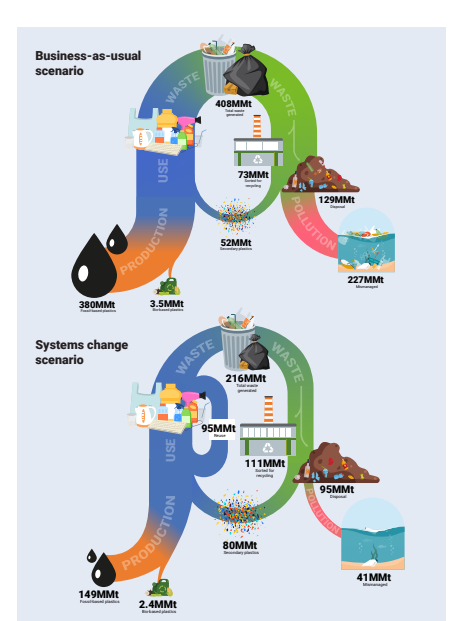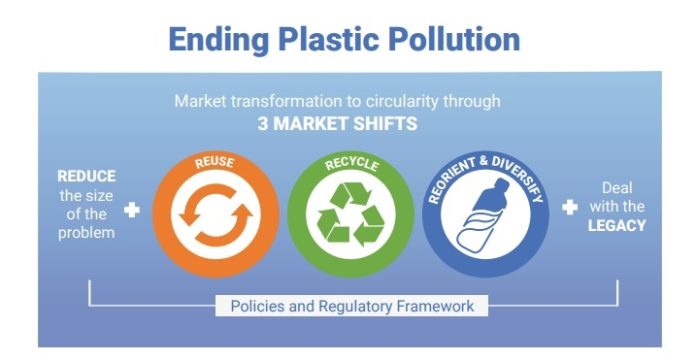A recent report released by the United Nations Environment Programme (UNEP) has argued that plastic pollution could be reduced by 80% if key stakeholders including both countries and companies adopt concrete practices, market shifts, and policies that can inform government thinking and business action.
The report which examined the economic and business models required to address the impacts of the plastics economy was entitled: “Turning off the Tap: How the world can end plastic pollution and create a circular economy”.
The report proposes a systems change to address the causes of plastic pollution, starting by reducing problematic and unnecessary plastic use, and redesigning the system, products, and packaging while combining these with a market transformation towards circularity in plastics.
According to the Executive Director, UNEP, Inger Andersen: “Everybody has a role to play. Governments can create the regulatory environment to incentivize the shift to a circular economy – and the political will to do so is there, backed by broad social support.
Andersen further added: “The petrochemical industry, municipalities, informal waste pickers, plastic converters, and key users – such as packaging, textile, transport, fisheries, and agricultural – can accelerate reuse and recycling and ensure the sustainability of alternatives introduced in the market. The finance industry can play a central role by aligning capital flows with a circular plastics economy.”
It was emphasized that the target can be achieved by accelerating three key shifts – reorient and diversify, reuse, and recycle, – and actions to deal with the legacy of plastic pollution.
The analysis in this report also examined the potential impacts of the systems change noted above. It shows the plastic flows in the economy in 2040 in a business-as-usual linear economy (top) versus that projected in the systems change scenario (bottom). Under the systems change scenario, the inflow of new (virgin) material into the economy of short-lived plastics is more than halved while the utility is unchanged, by increasing the flows of materials that are reused or recycled into the economy to 27 per cent of the total. As a result, the outflow of mismanaged plastic waste ending.

Top: modelled plastic flows of short-lived plastics in 2040 under a business-as-usual scenario;
Bottom: modelled plastic flows of short-lived plastics in 2040 under a systems change scenario.
Source: UNEP modelling building on The Pew Charitable Trusts and Systemiq (2020) and OECD (2022).
It was also indicated that a transformed plastics economy will introduce new economic benefits by bringing new business opportunities, particularly for those who adapt faster.
While significant, the investment costs of the systems change are less than the current investment trajectory, around USD 65 billion per year through 2040 as opposed to USD 113 billion per year. But time is of the essence: A
5-year delay could lead to an increase of 80 million metric tons of plastic pollution (The Pew Charitable Trusts and Systemiq 2020).
By 2040, it is estimated that a new plastics economy could:
- Create opportunities for jobs, income, and innovation: 700,000 additional jobs; improved livelihoods for millions of workers in informal settings; close to USD 1.3 trillion (10.3 percent) savings in direct public and
private costs between 2021 and 2040. - Reduce damage to human health and the environment by reducing exposure through an 80 percent reduction of plastic pollution; 0.5 Gt CO2-eq GHG emissions prevented annually; avoiding USD 3.3 trillion of environmental and social costs between 2021 and 2040 (32.5 percent cost savings).
- Reduce liabilities, risks, and litigation associated with damage from plastic pollution.
- When the direct, environmental, and social cost savings are added up, more than USD 4.5 trillion are saved, or 20.3 percent reduction in costs overall
The report concluded that the economics of the systems change scenario
are favourable both in terms of direct and indirect costs as there will be savings from moving towards a circular plastics economy – with lower costs, more and greener jobs, reduced toxic and greenhouse gas emissions and no plastic pollution.
“To reach the goal will require shifting prevailing economic incentives from resource-inefficient, linear models to those that reward the first movers and innovators behind circular systems that prevent pollution. There can be no systems change without policy change”, it stated.
Source: UNEP
Do you want to share your impact stories or pitch the coverage of your CSR event to us? E-mail: editor@impactwatch.net or *Phone +234-806-795-0250 (Whatsapp &Text)





